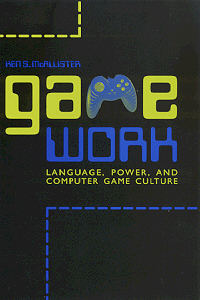introduction
|
| praxis | |||
|
McAllister demonstrates the flexibility of his grammar in the second half of his book. In the third chapter, he uses his method to investigate how game developers manage meaning and employ rhetoric through three industry contradictions:
He concludes that the evolution of game development from "an art to an industry" is tolerated insofar as the logic of late capitalism has penetrated the business: "so even an industry that prides itself on progress, that progress is to be strictly technological and ought not to have aspirations to transform society to make it a more just and equitable place" (114). In the fourth chapter, McAllister demonstrates how the act of game reviewing influences "agent/consumers" and creates a market for computer games. Because game reviews serve to guide consumers to appropriate games, they ultimately pay their greatest service to consumerism. Thus, they teach players how to respond to computer games primarily as consumers and often arbitrate what is "cool, acceptable, and humdrum" for the industry (138). In the fifth chapter, McAllister investigates the economies of the popular "god-game" Black & White. Economies, to McAllister, indicate where people place value. And in Black & White, he locates three economies: natural resources, spiritual resources, and time (145). Through experimentation, players ultimately learn such things as how to generate belief, process natural resources, train a creature to act in certain ways, expand territory, and become a supreme god (163). In order to make sense to the player, these teachings draw upon a familiar ideology such that it is reinforced through the gameplay: "get all the power" (163-4). |
|||
